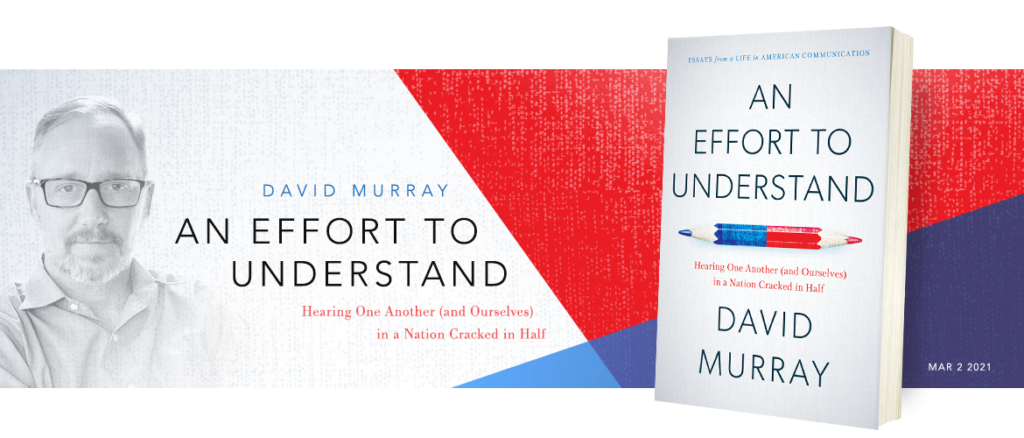A lot of people have told me they’re looking forward to my forthcoming book, An Effort to Understand. And I think they mean it. I think they see it as a kind of Hail Mary pass for Americans who have felt so painfully estranged from so many of our fellow citizens for so long.
Other people are irritated by the book, and its focus on “hearing one another (and ourselves in a nation cracked in half.”
I think both factions misunderstand the book. But for grins, let’s take on the skeptics first.

Rick Perlstein represented their view most directly, in turning down my request for him to endorse the book. “Doesn’t look like the kind of thing I’d like,” said the historian and author of the classic Nixonland and the more recent Reaganland. “I hold the unfashionable opinion that communicating with one another isn’t anything near the top of national priorities. Defeating fascism is.”
My friends, naturally, are less direct, because friends don’t shit all over friends’ forthcoming books. But they find ways to withhold enthusiasm, or to question the worthiness of some people who have endorsed the book.
Or by asking polite questions, like a onetime editor of mine: “I’m curious about one thing: Who are the bad guys in your book?” I told him we all are, but added that we’re the good guys, too. I bet he was less satisfied with my answer than he was that he had made his point.
Here’s what I think bugs some people about the book, four months before anyone has read it. They assume it is a naive Rodney King-like call to get along, at a moment that calls for the fighting of evil with force: Organizing, getting out the vote, firing up our troops to go to battle.
“A little less conversation,” sang Elvis Presley, “a little more action.”
I do not disagree one bit with that. I cherish and honor many, many people in my life who are vastly more thoughtful and knowledgeable than I am about politics and how it works, more savvy about activism and how to do it. They grew up in political families, or they came of age during Vietnam and Nixon.
That’s not me. My parents came from different socioeconomic backgrounds and voted straight tickets, opposite one another. But one thing they shared in common was that they thought politics was basically a boring subject. I have spent far more of my life than my parents did thinking, talking and writing about politics (and marching in demonstrations). Still, it’s not in my blood. And you don’t want to read a book by me on politics. It would be boring.
I do, however, find that I have a few ideas about how people ought to treat one another and how they ought to conduct themselves with colleagues, friends, family, in order to avoid making a horribly divided society more so. And possibly to make things a little better. Yes, even in the middle of a moment that’s clearly dominated by politics.
Can you focus on political action while I talk about communication?
“The test of a first-rate intelligence is the ability to hold two opposing ideas in mind at the same time and still retain the ability to function,” F. Scott Fitzgerald said. “One should, for example, be able to see that things are hopeless yet be determined to make them otherwise.”
My book is titled, An Effort to Understand—not How to Love Your Enemy or Talk Your Way to Peace in Our Time or Communication Secrets for Making America Great Again. So to my friends who see politics and power as the first best way to right social inequities and injustices, I agree. But while we’re each fighting to change society toward the dictates of our own consciences, isn’t it well to occasionally think about we might live in that society more gracefully and thoughtfully and honestly? And to contemplate how the “bad guys” got to be so bad? And to acknowledge, in hopes that we come off as a little less self-righteous, that there’s a little bad guy in each of us?
Now, I hope that doesn’t seem too humble an aim for folks who have pre-ordered the book and expect it might make a difference for them or for others. I do believe that the wisdom in this book—which I have drawn from a whole life thinking about communication and surrounded by communicators—is essential to living a good American life right now. And I believe the more of us who read the book and share some of this perspective in common with one another, the better for us the book will be.
And I believe we need all the wisdom we can get these days, and need it bad. As I replied to Perlstein, “This comes out in March—after we have defeated fascism, I hope—and as we are trying to think about how to keep fascism from returning in four short years.”
Leave a Reply